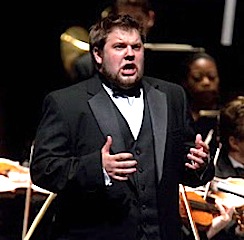
A Grand Night for Singing
If opera is about great singing – what else? – a tale
was told Saturday night (September 25) at Ascension Lutheran Church in Montgomery, Ohio.

“Music at Ascension,” one of the fine music series based at area churches, opened its new season with an opera gala – no less.
Joined by pianist Albert Mühlböck, nine Cincinnati-based opera singers regaled a happy congregation in the sanctuary of the church with a program of arias and duets ranging from Handel to Benjamin Britten. It was an upbeat evening, the singers reminding their listeners from time to time of the fun they (the singers) were having.
Participating in
fully collegial fashion – no divos or divas here – were sopranos Katy Lindhart,
Stacey Erin Sands and Blythe Walker, mezzo-sopranos Emily Lorini and Ivy Walz,
tenors David Bezona and Mateo Husted, baritone Michael Young and bass Samuel
Smith. Not that they don’t have bragging
rights (see below).
As for pianist Mühlböck, a native of Austria
pursuing his doctorate at CCM, he must be counted as one of Cincinnati’s finest
recent acquisitions.

Bezona, Director of
“Music at Ascension“ opened fittingly and sonorously with “Without a Song“ by
Vincent Youmans (from the 1929 musical “Great Day“). From there the program proceeded in more or
less chronological order.

Walz opened
with Sesto’s aria Svegliatevi nel core (“Awaken
in my heart“) from Handel’s “Julius Caesar.“
She put steel in the role (a male role sung by a female, or so-called "pants role"), projecting
with conviction the young man’s determination to avenge his father’s murder.

As if by contrast,
Husted followed with Quanto e bella (“How
beautiful she is, how sweet“), Nemorino’s love-smitten aria from Donizetti’s “Elixir
of Love.“ Smith, Lindhart and Young
picked up the amorous thread with three selections from Mozart’s “Marriage of
Figaro.“

Smith sang Figaro’s Se vuol ballare (“If you wish to dance“) with appropriate bluster and
barb, Figaro having suddenly realized that
Count Almaviva has designs on his bride-to-be (Susanna).

Lindhart’s caressing tone and alluring manner
fit Susanna beautifully in Giunse ’al fin
il momento (“the moment finally arrives“), where she pretends to welcome the Count’s attentions
to make Figaro jealous. As the Count,
Young chewed up the scenery -- if there had been any – in Hai gia vinta la causa (“You’ve won the case already“) where the
predatory Almaviva furiously vents his anger at his wife (the Countess), whom
he suspects of cheating on him.
It was back to Donizetti’s “Elixir“ in the duet Esulti pur la barbara (“rejoice while the cruel one . . .“) where the now inebriated Nemorino (Husted) expresses a bit more confidence toward the object of his affections, Adina, sung with coquettish assurance by Lindhart.
Charles Gounod’s very first opera, “Sapho,“ got a rare outing in O ma lyre immortelle (“my Immortal lyre“) where the ancient Greek poetess laments an unhappy love affair before throwing herself into the sea. Walz delivered this plangent aria in an affecting stream of melody, accompanied so vividly and with such great skill by Mühlböck that one might well have asked “who needs an orchestra?“
Mezzo Lorini took
the stage
next in another pants role, Nicklausse from Offenbach’s “Tales of Hoffmann.” Her full, lavish voice was persuasive indeed
in Sous l’archet fremissant (“under
the bow quivering”), also called the “Violin Aria,” where Nicklausse urges the
unhappy poet to take refuge in his art.

Soprano Stacey Erin Sands followed with Glück das mir verlieb
(“Joy that near to me remains,” or “Marietta’s Song”) from Erich Wolfgang Korngold’s
1920 “Die Tote Stadt” (“The Dead City”).
Her convincing delivery served to remind listeners of the great operas that have yet to appear onstage in Cincinnati. Korngold, who was Jewish, left Nazi Germany
to come to Hollywood where he pursued a distinguished career in film music, eclipsing (for a time) his earlier output.

Smith’s Ella giammai m’amo (“she never loved me”), King Philip’s Monologue from Verdi’s “Don Carlos,” was one of the evening’s highlights. Smith brought the lonely monarch achingly to life, expressing his conflict both visually and vocally. Again, as throughout the evening, Mühlböck’s accompaniment was superb.
Soprano Walker, who has made Cincinnati proud from
the stage of the Metropolitan Opera to passionate advocate for singing at her
own Academy of Vocal Arts in Kenwood,
honored Puccini in Liu’s aria Signore, ascolta
(“Signor, listen”) from “Turandot.”
Young returned to fill the room with Ford’s aria Esogno? O realta? (“Is it a dream or reality?”) from Verdi’s “Falstaff.” “This is what I just sang,” Young said, “but that’s the life of a baritone, jealous lovers, fathers and brothers.” (Ford and Mozart’s Figaro share the same doubts about their wife and fiancée, respectively.)
Sands, who opens Ascension’s fall chamber concert series at 7 p.m. October 9, gave a stirring performance of the “Embroidery Aria” from Britten’s “Peter Grimes” (the moment in the opera when the widow Ellen discovers that a sweater she has knitted has been found on the body of another young fisherman apprenticed to Grimes). Lorini and Walker sang Octavian and Sophie’s “Presentation of the Rose” (Mir ist die Ehre widerfahren, “to me happened the honor”) from Strauss’ “Der Rosenkavalier,” bringing the program to a rapturous conclusion.
The encore was Neapolitan favorite, “O sole mio,” begun by Bezona and repeated as a sing-along by entire company and the audience.
All concerts at Ascension begin at 7 p.m. and are free and open to the public (free-will donation accepted). The church is located at 7333 Pfeiffer Rd. in Montgomery. For information, call (513) 793-3288.
As for those bragging rights, tenor/”Music at Ascension” director Bezona spent a distinguished career in Europe and has 46 roles in 39 operas, plus 55 oratorios, masses and cantatas to his credit. A native of Wilmington, Ohio, he was protege of opera great John Alexander and is an adjunct professor at Wilmington College in Wilmington and Blue Ash.
Soprano Walker, a winner of the Metropolitan Opera National Council Auditions, has sung at the Met and now teaches at the Blythe Walker Academy of Vocal Arts (BWAVA!) at the Cincinnati Music Academy in Kenwood.
Sands, Smith and Young are
graduates of the University of Cincinnati College-Conservatory of Music, where
they have sung with distinction in main stage roles. A native of Florence,
Kentucky Sands is also a member of Cincinnati’s professional Vocal Arts
Ensemble. Cincinnati native Smith has
sung with Lyric Opera of Chicago and many other U.S. opera companies (see him
on YouTube by searching “Samuel Smith Don Pasquale“). Young, first place winner in the 2010 Palm
Beach Opera Competition, was one of Cincinnati Opera’s 2010 Corbett Foundation
Young Artists.
Walz is a CCM doctoral candidate who has performed for Cincinnati Opera and Spoleto USA. Husted and Lorini (husband wife) have graduate degrees in voice from Miami University. Texas native Husted studied at the American Institute of Musical Studies in Graz, Austria. Lorini, who is from Pittsburgh, apprenticed with Santa Fe Opera for two years. Iowan Lindhart, an award winner in the Metropolitan Opera district auditions, will sing Marzelline in Beethoven’s “Fidelio” with Dayton Opera this season.